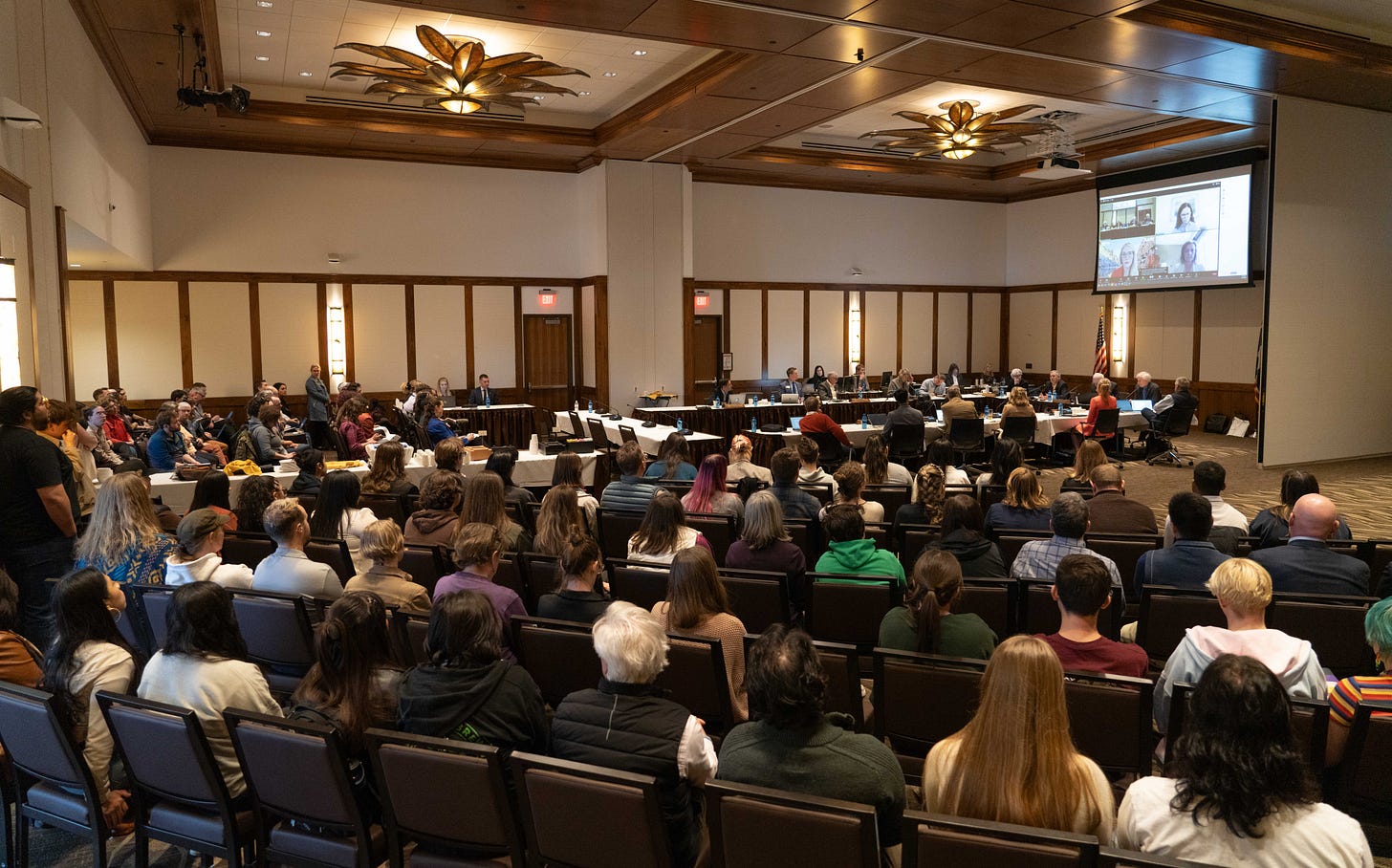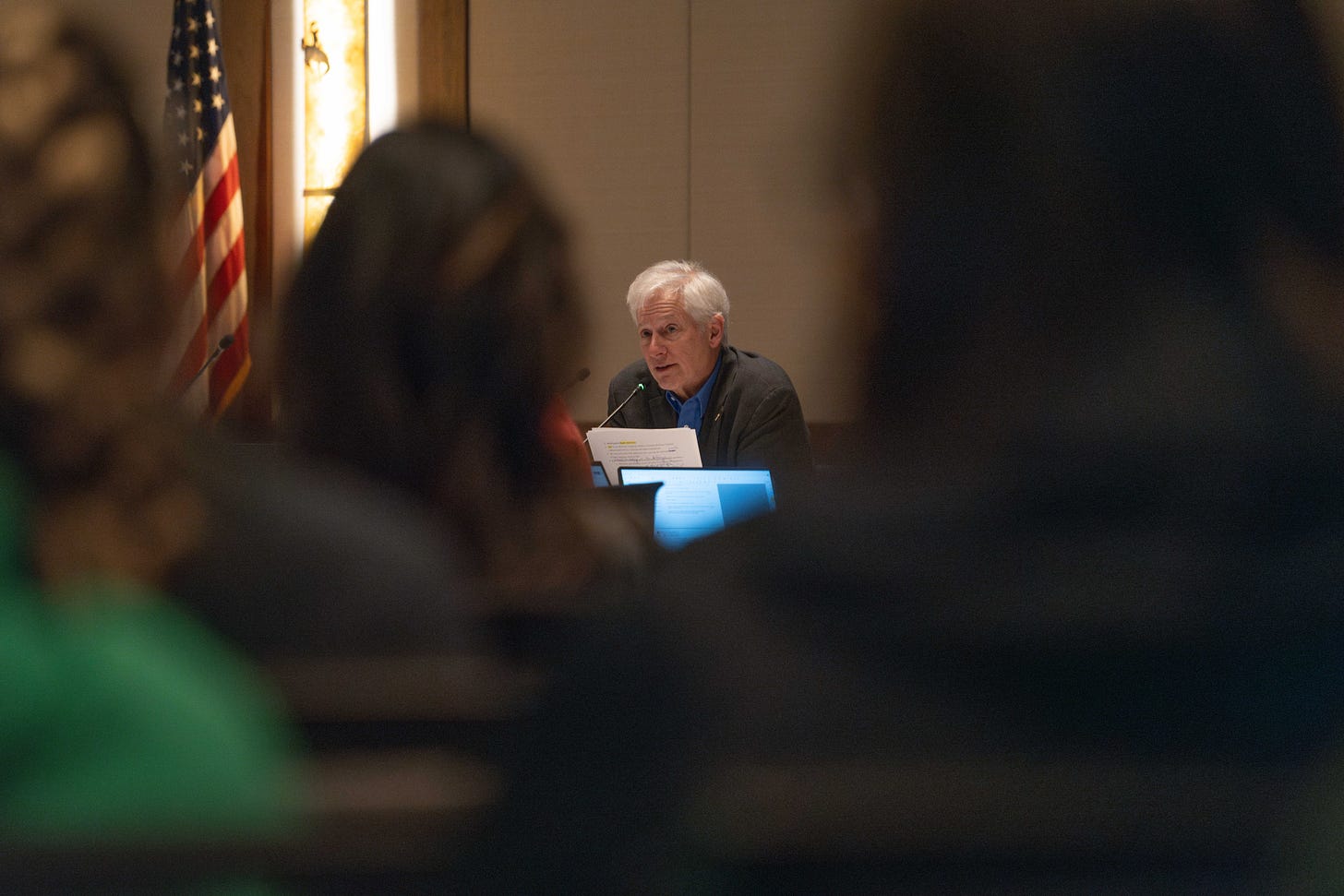With its diversity office under fire, UW gathers in solidarity
University leadership discussed the future of UW's Diversity, Equity and Inclusion Office during an “extraordinary” board meeting attended by more than 100 students, faculty and staff.
Whatever happens this weekend, the university community has been reassured that the UW Board of Trustees, and President Ed Seidel, stand firmly behind the mission of UW’s Office of Diversity, Equity and Inclusion.
That office, however, could be eliminated today or tomorrow when Gov. Mark Gordon issues his final decision regarding the state budget and its various agency allocations.
There was an “extraordinary” turnout for the trustees meeting Thursday, when more than 100 students, faculty and staff turned out to demonstrate their support for the DEI Office and its programs.
Among them was Professor Camellia Moses Okpodu, a decorated biologist who was very nearly the first African American dean of the College of Arts & Sciences. She said UW should continue to promote diversity, equity and inclusion — even if the university’s efforts have to be labeled something else.
“If ‘DEI’ is causing people such heartburn, I think it’s because of their misconception of what DEI means,” Okpodu said. “I want to be able to ask people to come here and be a part of what we’ve established, but I can’t do that in good faith if I don’t feel that we’re even giving any voice to what it means to have an environment that is inclusive.”

The Wyoming Legislature passed its final version of the state budget earlier this month. That budget, which will direct state spending for the next two years, includes roughly $504 million for UW.
But this session, lawmakers added a footnote to the portion of the state budget outlining UW’s cut. The footnote stipulates that the university must not expend any state dollars on an Office of Diversity, Equity and Inclusion or on “any diversity, equity and inclusion program, activity or function.”
While the DEI Office itself serves a number of crucial functions — such as maintaining federal compliance with laws like the Americans with Disabilities Act — it also presides over a number of programs geared toward student success or recruitment and retention. An even wider range of programs and services not directly managed by the DEI Office could fall under the broader umbrella of “diversity, equity and inclusion.”
The footnote does not define the term “diversity, equity and inclusion” — even as it moves to ban the concept. That ambiguity has raised alarm bells on campus, where programs supporting LGBTQ+, non-white, veteran, first-generation, Native American and other marginalized students have suddenly been called into question.
The state budget is now on the governor’s desk, awaiting his signature and line-item vetos. Before students and faculty go to class next Monday, they will know whether Gordon has spared the DEI Office, or spared UW’s DEI efforts more generally. For now, uncertainty reigns. But the incredible turnout during the trustees’ meeting Thursday — and the response from the trustees — appear to have quelled at least some of that uncertainty.
“I fully support the mission and programs and ideals of diversity, equity, inclusion,” Trustee Brad Bonner said. “And I want to work very hard to make sure that we keep that support.”
University leaders made clear they will save the “essential” and “necessary” programs currently housed in DEI, even if the budget footnote is allowed to stand.
“We are committed to continue activities that our community needs,” Seidel said. “We want to make sure that our community continues to feel welcome, and to feel supported, so they can be successful — whether they’re students, faculty members or staff.”

This could mean moving or redefining programs or, as Trustee Carol Linton suggested, funding them through alternate means.
“I feel like everything that our program does is something that is necessary and helpful for our UW community, student success, faculty success, staff success,” she said. “I totally support what our DEI office does and think we need to have funding for it — if not from the legislature’s block grant then from somewhere else.”
The board heard from various students who had benefited from DEI or DEI-adjacent efforts at UW — students such as Lauren Zotta, an autistic transfer student whose grades “skyrocketed” after she found Disability Support Services, and Priya Chaudhari, a first-generation student who runs a club for Asian-American students like herself.
“Without these diversity efforts, I would not have gone to college in the first place,” Chaudhari said. “I didn’t think there was a place for me there. Especially in a place like Wyoming, where I felt like I was in the minority. These diversity efforts are what keep students like me on campus. They’re what keep us engaged as part of the community.”
The board heard from more than a dozen members of the public during its midday public comment period. But as it discussed the DEI footnote later that afternoon — as the audience grew so large that staff had to remove a ballroom partition to double the size of the room — Board Chair John McKinley again cut to the public for further input. He extended that public comment period when it blew past its initial ten-minute allotment.
“The public comment was very important,” McKinley said. “I applaud everybody that provided it this morning and now. It is a necessary process for us to understand and (for) the administration to begin to put together a working policy that functions for the university.”
McKinley said the board would discuss the issue again at its May meeting, at which point the university will know whether DEI has survived.
President Seidel has been compiling an inventory of programs affected by the footnote and he will present that inventory in May.
“Regardless of the outcome of the legislation … we are going to continue to carry out an inventory of these activities,” Seidel said at the close of the discussion. “And we’re going to think very hard about how they comport with what the Constitution says, what our best practices are, what is needed here by our community. And our commitment to you is to continue to do the things that we believe are essential for you … We’re going to look at it all and we will develop a kind of a policy framework.”

The footnote forbidding UW from spending state dollars on its DEI Office, or on DEI efforts, was the brainchild of Sen. Cheri Steinmetz (SD-3). When she introduced the footnote, her political allies added colorful input about DEI efforts on college campuses and in other institutions, drawing exclusively from examples outside Wyoming.
Sen. Charles Scott (SD-30) called the DEI Office a “monolith of wokeness” and said offices like it were the source of “rot” within modern universities. Sen. Anthony Bouchard (SD-6) blamed DEI efforts for recent airplane failures. Sen. Troy McKeown (SD-24) suggested Wyoming should not embrace the modern ideas such an office represents. He recalled with fondness a hat he once owned.
The hat said this: “Welcome to Wyoming, set your clock back 10 years.”





Have to say this is appalling. And frankly embarrassing. What is the end goal here. The equality state??
I'm glad hats are now involved in determining funding decisions in the great state of Wyoming.